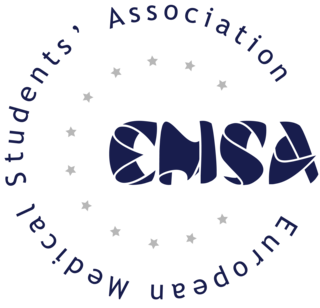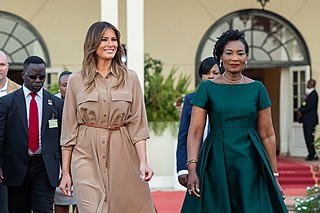
Occupational therapy (OT) is a healthcare profession. It involves the use of assessment and intervention to develop, recover, or maintain the meaningful activities, or occupations, of individuals, groups, or communities. The field of OT consists of health care practitioners trained and educated to improve mental and physical performance. Occupational therapists specialize in teaching, educating, and supporting participation in any activity that occupies an individual's time. It is an independent health profession sometimes categorized as an allied health profession and consists of occupational therapists (OTs) and occupational therapy assistants (OTAs). While OTs and OTAs have different roles, they both work with people who want to improve their mental and or physical health, disabilities, injuries, or impairments.
The Arab Community Center for Economic and Social Services (ACCESS) is a human services organization committed to the development of the Arab American community. ACCESS helps low-income families, as well as newly arrived immigrants adapt to life in the United States. Its goal is to foster a greater understanding of Arab culture in the U.S. and in the Arab world. ACCESS provides social, mental health, educational, artistic, employment, legal, and medical services.

Health human resources (HHR) – also known as human resources for health (HRH) or health workforce – is defined as "all people engaged in actions whose primary intent is to enhance positive health outcomes", according to World Health Organization's World Health Report 2006. Human resources for health are identified as one of the six core building blocks of a health system. Human resources for health include physicians, nursing professionals, pharmacists, midwives, dentists, allied health professions, community health workers, social health workers and other health care providers, as well as health management and support functions personnels like cleaner, guard etc. who add important values as part of the wider health systems so that enhance the delivery of essential healthcare services effectively and efficiently. Effective health system functioning highly demand well trained health services managers, medical records and health information technicians, health economists, health supply chain managers, medical secretaries and others.
Allied health professions are health care professions distinct from optometry, dentistry, nursing, medicine, and pharmacy. They provide a range of diagnostic, technical, therapeutic, and support services in connection with health care.

Orbis International is an international non-profit non-governmental organization (NGO) dedicated to saving sight worldwide. Its programs focus on the prevention of blindness and the treatment of blinding eye diseases in developing countries through hands-on training, public health education, advocacy and local partnerships. Since 1982, Orbis capacity-building programs have enhanced the skills of 325,000 eye care personnel and provided medical and optical treatment to more than 23.3 million people in 92 countries.
Human Concern International (HCI) is a Canadian federally registered charitable non-governmental organization (NGO) working in international development and emergency relief assistance since 1980.

The European Medical Students' Association (EMSA) is a non-governmental and non-profit organisation for medical students; it offers opportunities to their members and provides a voice for medical students across Europe, representing their interests to other European institutions and organizations. EMSA was founded in Brussels in 1990. It integrates medical students in Europe through activities organized for and by medical students. EMSA's network and platform encourages medical students from various countries in geographical Europe to actively engage in matters related to health care, medical education, medical ethics, medical science, and general societal well-being, by acting as a conduit for increased interaction and sharing of knowledge between European medical students in these respective areas.
Citizen Corps is a program under the Department of Homeland Security that provides training for the population of the United States to assist in the recovery after a disaster or terrorist attack. Each local Citizen Corps Council partners with organizations, volunteers and businesses to organize responders, volunteers and professional first responders for an efficient response so efforts are not wasted by being duplicated. By training in Incident Command, volunteers know whom to report to and how the incident is organized. This prevents sites from being inundated by untrained and unprepared personnel preventing operation. Citizen Corps also works in conjunction with the Corporation for National and Community Service in promoting national service opportunities for promoting homeland security needs.
World Vision Appalachia is an organization of World Vision, an international Christian relief and humanitarian organization serving the world's under-resourced children and families in nearly 100 countries. World Vision Appalachia's work in Appalachia, United States began in 1983 when the organization provided a $1000 grant to help fund the construction of a basketball court in the Chestnut Ridge community of Barbour County, West Virginia. This grant and the completion of the basketball court marked the beginning of what has grown into over twenty-four years of a deepening commitment to the Appalachian region. World Vision Appalachia serves families and organizations in 37 of West Virginia's 55 counties and surrounding states.
NAFSA: Association of International Educators is a non-profit professional organization for professionals in all areas of international education including education abroad advising and administration, international student advising, campus internationalization, admissions, outreach, overseas advising, and English as a Second Language (ESL) administration. As of 2010, it served approximately 10,000 educators worldwide, representing nearly 3,000 higher education institutions.

The United States established diplomatic relations with Malawi in 1964 after Malawi gained independence from the United Kingdom. Malawi's transition from a one-party state to a multi-party democracy significantly strengthened the already cordial U.S. relationship with Malawi. Significant numbers of Malawians study in the United States. The United States has an active Peace Corps program, Centers for Disease Control and Prevention, Department of Health and Human Services, and an Agency for International Development (USAID) mission in Malawi. Both countries have a common history and English language, as they were part of the British Empire.

Nursing is a profession within the healthcare sector focused on the care of individuals, families, and communities so they may attain, maintain, or recover optimal health and quality of life. Nurses may be differentiated from other healthcare providers by their approach to patient care, training, and scope of practice. Nurses practice in many specialties with differing levels of prescription authority. Nurses comprise the largest component of most healthcare environments; but there is evidence of international shortages of qualified nurses. Nurses collaborate with other healthcare providers such as physicians, nurse practitioners, physical therapists, and psychologists. Unlike nurse practitioners, nurses typically cannot prescribe medications in the US. Nurse practitioners are nurses with a graduate degree in advanced practice nursing. They practice independently in a variety of settings in more than half of the United States. Since the postwar period, nurse education has undergone a process of diversification towards advanced and specialized credentials, and many of the traditional regulations and provider roles are changing.

A community health worker is a member of a community who is chosen by community members or organizations to provide basic health and medical care within their community, and is capable of providing preventive, promotional and rehabilitation care to that community. Other terms for this type of health care provider include lay health worker, village health worker, community health aide, community health promoter, and health advisor.
The International Assistance Mission (IAM) is the longest continually serving non-profit organisation in Afghanistan. They are a well-respected NGO working to improve lives and build local capacity in health, development and education. They are a partnership between the people of Afghanistan and international Christian volunteers, who have been working together since 1966. IAM is registered in Geneva, Switzerland, and is the longest continuously serving NGO in Afghanistan, and only works in Afghanistan.
Workforce development, an American approach to economic development, attempts to enhance a region's economic stability and prosperity by focusing on people rather than businesses. It essentially develops a human-resources strategy. Work-force development has evolved from a problem-focused approach, addressing issues such as low-skilled workers or the need for more employees in a particular industry, to a holistic approach considering participants' many barriers and the overall needs of the region.
Unlicensed assistive personnel (UAP) are paraprofessionals who assist individuals with physical disabilities, mental impairments, and other health care needs with their activities of daily living (ADLs). UAPs also provide bedside care—including basic nursing procedures—all under the supervision of a registered nurse, licensed practical nurse or other health care professional. UAPs must demonstrate their ability and competence before gaining any expanded responsibilities in a clinical setting. While providing this care, UAPs offer compassion and patience and are part of the patient's healthcare support system. Communication between UAPs and registered nurses (RNs) is key as they are working together in their patients' best interests. The scope of care UAPs are responsible for is delegated by RNs or other clinical licensed professionals.

Volunteering is a voluntary act of an individual or group freely giving time and labor for community service. Many volunteers are specifically trained in the areas they work, such as medicine, education, or emergency rescue. Others serve on an as-needed basis, such as in response to a natural disaster.
Cuso International is a Canadian international development organization that connects communities around the world with skilled Canadians to help end poverty and inequality. Established in 1961, Cuso International has deployed more than 15,000 volunteers and has worked in more than 100 countries on long-term development projects.
International volunteering is when volunteers contribute their time to work for organisations or causes outside their home countries. International volunteering has a long association with international development, with the aim of bringing benefits to host communities.







